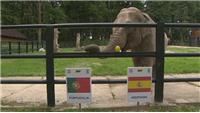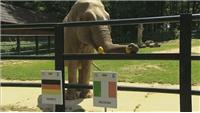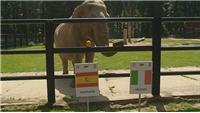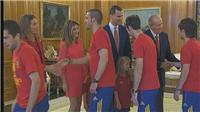
Germany captain Philipp Lahm and team-mates on Friday honoured Holocaust victims in an emotionally-charged visit to the site of the former Nazi German death camp of Auschwitz-Birkenau.
An AFP reporter saw the delegation from the German Football Federation (DFB) arrive at the World War II site on the edge of the southern Polish city of Oswiecim.
The visit came a day after Germany beat Israel 2-0 in a friendly in the German city of Leipzig and three days before the squad arrives in Poland ahead of the European championship.
"With the visit to Auschwitz, we wanted to show that a dark chapter of German history will never be forgotten and must never be repeated," team manager Oliver Bierhoff said in a DFB statement.
Besides Lahm and Bierhoff, the delegation also included head coach Joachim Loew, Poland-born Germany stars Miroslav Klose and Lukas Podolski, and DFB president Wolfgang Niersbach.
In driving rain, they walked under the "Arbeit Macht Frei" gateway sign. A notorious symbol of the Nazis' cynicism, it translates as "work makes you free", even though few survived the camp.
They visited the barracks, the wall where prisoners were shot and the crematorium where the victims' bodies were burned.
The delegation then headed to Birkenau, the site three kilometres away where the Nazis gassed the majority of the Jews sent to the camp.
There they laid a wreath at the Birkenau memorial which lies near the remains of the gas chambers, which were blown up by the Nazis as they retreated in 1945.
In the DFB statement, Niersbach called the Nazi era an "inhuman chapter" in German history.
He underscored the "warning" of Richard von Weizsaecker, the president of Germany from 1984 to 1994, who once said: "Whoever closes his eyes to the past is blind to the present."
"It is our obligation and our responsibility to pay close attention and communicate with the many young players at our clubs that there is no place for anti-Semitism, racism and intolerance," Niersbach said.
On Thursday, Lahm had underlined the importance of visiting the site of Nazi atrocities having personally visited the Dachau concentration camp near Munich in Germany.
"This is an important symbol from our side," he said.
"We need to show that we know our history and we must take ownership of our past responsibilities, even if our generation is not responsible."
Bierhoff, meanwhile, had noted that the planned visit was "not a PR event".
"The subject of the Holocaust and Auschwitz has occupied us again and again and has been discussed with the players," he said.
The squad has already attended lectures on modern German history ahead of Euro 2012 in Poland and Ukraine -- the first ever edition of the tournament to be held in Eastern Europe, a region which was home to most of the Jews killed in the Holocaust.
England and Italy have also said their players will visit the Auschwitz site during the tournament, which runs from June 8 to July 1.
The Nazis set up Auschwitz in a former Polish army base, shortly after invading Poland in 1939, initially to detain and kill Poles seen as a pool of resistance to their occupation.
They gradually expanded the site at Birkenau, turning it into a hub for the Holocaust.
Of the camp's 1.3 million victims, 1.1 million were Jews from across Nazi-occupied Europe.
The few survivors were liberated by Soviet troops in January 1945, and the site was turned into a Polish state-funded memorial and museum.
- Arbeloa: Spain must never change their style
- Wedding bells turn Iniesta's legs to jelly
- Pele: Brazil's 1970 World Cup winners better than Spain
- Pirlo: Only Spain are superior to Italy
- Spain disproved boring tag with empathic final win, insists Alonso
- Fernando Torres revels in Euro 2012 crown
- Italy can reach the final at World Cup 2014
- Johan Cruyff: I enjoyed Italy and I'm a big fan of Del Bosque's Spain
- De Gea & Mata named in Olympics squad
- Shevchenko: Euro 2012 was a success for Ukraine
Hot News
- Funny Balotelli!
- Spanish fans celebrate Euro Cup win
- That's German WAGS!
- The sexy female fans in Euro 2012
- Euro 2012: Spain fans celebrate victory
- Spain vs Italy in clash of the Euro WAGs
- Euro 2012 Final - Spain 4 : 0 Italy, Part 2
- Germany knocked out by Italy
- Natalia Siwiec blasts Sol and the BBC
- Coleen Rooney reveals her bikini body secrets
- Italy's fans celebrated wildly
- Euro 2012 Final - Spain 4 : 0 Italy, Part 1
| Rank | Team | W/D/L | Pts |
|---|
Cities & Stadiums
The Top 3 Teams of Previous Tournaments
| Year | Winners | Runner-up | Third place |
|---|---|---|---|
| 2008 | Spain | Germany | Russia / Turkey |
| 2004 | Greece | Portugal | Netherlands / Czech Republic |
| 2000 | France | Italy | Netherlands / Portugal |
| 1996 | Germany | Czech Republic | France / England |
| 1992 | Denmark | Germany | Netherlands / Sweden |
| 1988 | Netherlands | Soviet Union | Italy / West Germany |
| 1984 | France | Spain | Denmark / Portugal |
| 1980 | West Germany | Belgium | Czechoslovakia |
| 1976 | Czechoslovakia | West Germany | Netherlands |
| 1972 | West Germany | Soviet Union | Belgium |
| 1968 | Italy | Yugoslavia | England |
| 1964 | Spain | Soviet Union | Hungary |
| 1960 | Soviet Union | Yugoslavia | Czechoslovakia |




